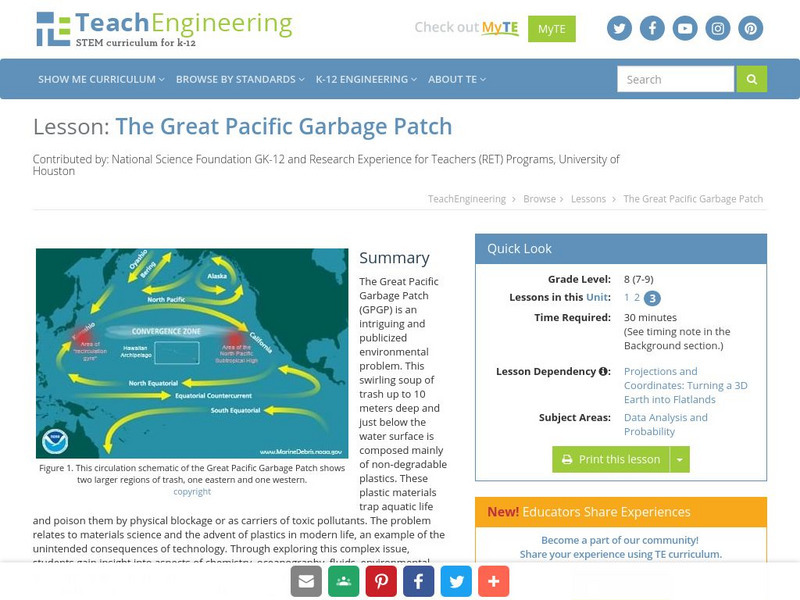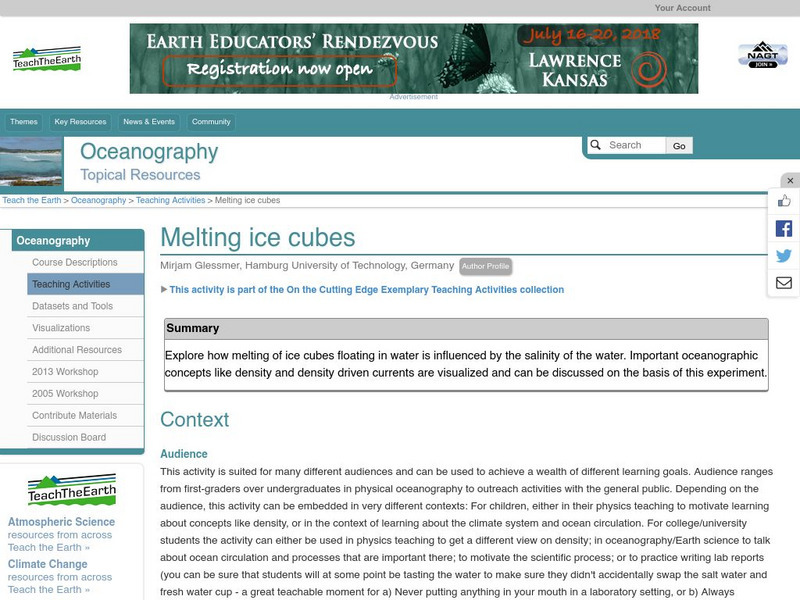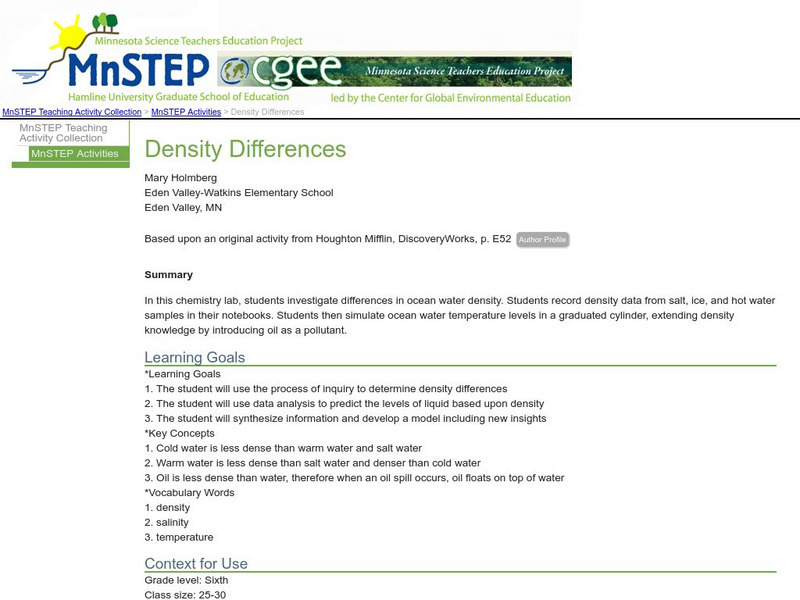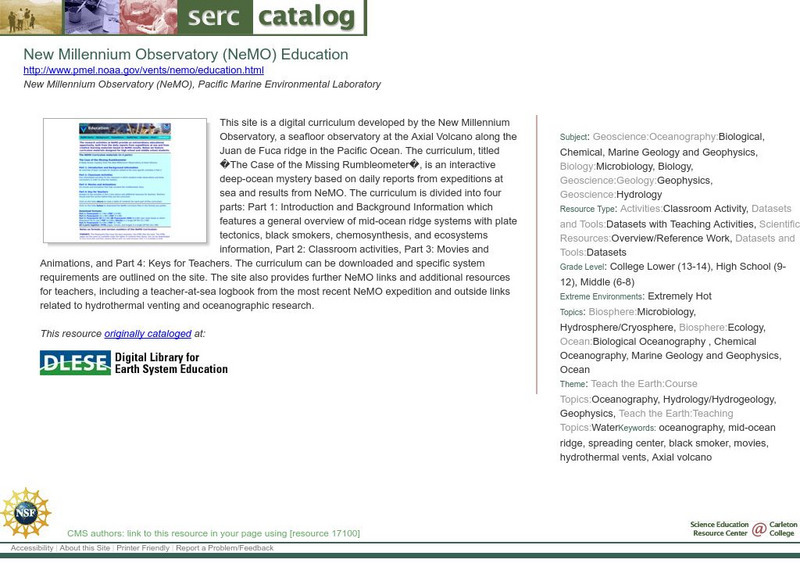Curated OER
Whale Migrations
Students use whale migration patterns to determine sex and age of whales and determine where these whales can be located during different seasons. They use mapping skills to plot the migration patterns of four unknown whales.
Curated OER
Ocean Morse Code
Students gain knowledge of the maritime importance of Morse code and enjoy applying this information to decipher Morse code messages from other students.
Curated OER
the New Explorers:Into the Depths
Students explore the self preservation mechanism that is inherent in the Great Lakes. They examine how scientists are studying Great Lakes, and what their predictions are for these national treasures.
Curated OER
Maintaining Body Heat
Young scholars observe and compare heat loss in different objects with surface-to-volume ratios. They transfer this comparison to the physical characteristics of animals in their environment. They focus on how whales maintain their body...
Curated OER
Water Density and Stability Lab
Students observe how different water densities and salinity control the depth at which different water masses occur. Submarines are used as a case study. This is a well-designed with an excellent worksheet.
Curated OER
Introduction to Remote Sensing
Students view, discuss, and compare different types of maps produced from remote sensing data. They use image processing software to analyze and enhance sea surface temperature maps.
Curated OER
Health, Pollution, and Safety: Why Should We Care?
Students examine the impact of reducing the carbon dioxide emissions. They identify ways alternative fuels can lessen the effect of emissions on communities. Working in teams they conduct research from various community and Internet...
Curated OER
Beach Zonation
Students identify and separate the different zones of the beach by observation. They investigate beach zonation by gathering and comparing sand samples gathered from different areas of the beach.
Curated OER
Estuarine Currents
Pupils explore an estuarine system to gather data on density driven currents. This type of current is contrasted with temperature and wind driven currents.
Curated OER
OCEAN PAINTINGS
Fifth graders research animal life in a coral reef. They learn and use the wax-resist technique for painting, and create a picture of an ocean animal.
Curated OER
Water: On the Surface and in the Ground
Pupils explore the differences between surface water and ground water. They collect data using maps and graphs and investigate a Texas river basin and a nearby aquifer. They complete a written report including maps and data regarding the...
Curated OER
What's Left to Explore-Space and the Ocean Floor
Students describe unique exploration studies of the ocean floor and space. They utilize research skills and write summaries of research studies using the Internet. Students answer a variety of questions over their research findings.
Curated OER
Sharkland Wiki
Students, while researching the waters around southern Africa and viewing a video of the episode "Sharkland" from Thirteen's series NATURE, critique reliability of online resources and analyze the various components of a wiki. They...
Curated OER
Global Change — Change and Cycles Where Land, Air and Water Meet
Pupils participate in an experiment to define a parts-per-billion solution. In this ecology lesson, students select a second substance to create a parts-per-billion solution and observe and record their results. Pupils work in groups to...
Curated OER
Pipeline to the Coral Reefs
High schoolers discuss the relationship of density to stratification. In this marine science lesson, students create a model of upwelling events using cold and warm water. They discuss how water phenomena affect coral reefs.
Curated OER
Head to Foot
Students describe the body form and major anatomical structures of squids and describe some unusual or unique features of newly-discovered deep water squid species. They infer what types of food squids use from their anatomical features.
University of South Florida
Project Oceanography: Single Celled Organisms [Pdf]
For this lesson, students explore three kinds of symbiotic relationships involving unicellular organisms. They will also look more closely at the relationship between zooxanthellae and coral, and the importance of nitrogen-fixing...
Other
Digital Library for Earth System Education (Dlese)
This resource provides materials for teachers on a huge array of topics. Search site by topic, grade level, and desired output (such as lesson plan, case study, assessment or tutorial). Site is focused on earth science, geography, and...
PBS
Pbs Teachers: Ocean Careers Exploration
Investigate careers in oceanography and marine exploration. Create a report on the life, education and career of a member of the Ocean Adventures Expedition team and present it in a creative way.
TeachEngineering
Teach Engineering: The Great Pacific Garbage Patch
The Great Pacific Garbage Patch (GPGP) is an interesting and somewhat publicized environmental problem. A swirling soup of trash up to 10 meters deep and just below the water surface is composed mainly of non-degradable plastics. These...
Science Education Resource Center at Carleton College
Serc: Melting Ice Cubes
This activity helps students understand how the melting of ice cubes floating in water is influenced by the salinity of the water. It will introduce the concept of density and density driven currents and provide practice in using the...
Gulf of Maine Research Institute
Gulf of Maine Aquarium: Comparing Oceans: Warm Up to the Gulf Stream
This site features some background information and a satellite image of the Gulf Stream that you can analyze using information also given at the site. There is a link to an activity about the formation of eddies along the Gulf Stream as...
Science Education Resource Center at Carleton College
Serc: Density Differences
Students investigate differences in ocean water density, and record density data from salt, ice, and hot water samples in their notebooks. Students then simulate ocean water temperature levels in a simulation.
Science Education Resource Center at Carleton College
Serc: New Millennium Observatory (Ne Mo) Education
This digital curriculum is an interactive deep-ocean mystery based on daily reports from expeditions at sea and results from NeMO and consists of four parts: Introduction and Background Information, Classroom activities, Movies and...
Other popular searches
- Oceanography Science
- Oceanography Activities
- Oceanography Vocabulary
- Oceanography Tides
- Introduction to Oceanography
- Oceanography Exploration
- Oceanography Lab
- History of Oceanography
- Careers in Oceanography
- Oceanography Shells
- Geological Oceanography
- Oceanography Careers
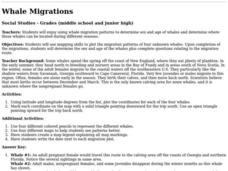


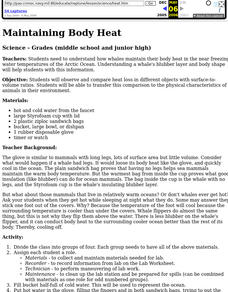

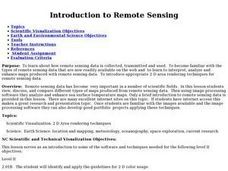










![Project Oceanography: Single Celled Organisms [Pdf] Lesson Plan Project Oceanography: Single Celled Organisms [Pdf] Lesson Plan](https://d15y2dacu3jp90.cloudfront.net/images/attachment_defaults/resource/large/FPO-knovation.png)


